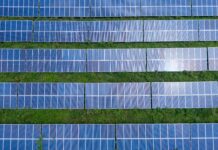Doug Young
China’s struggling solar panel makers must are slowly transforming into de facto state-owned enterprises as they take increasing loans from Beijing, with Canadian Solar (Nasdaq: CSIQ) becoming the latest to take a handout from the policy lender China Development Bank (CDB). If Beijing is trying to convince Europe and the US that it’s not unfairly supporting its solar sector, then this certainly isn’t the way to do it. But that said, I doubt that Canadian Solar or many of its peers could get financing to maintain their operations from any true private sector banks right now, as the future remains unclear for most due to their precarious financial positions.
This latest deal looks at least slightly positive for Canadian Solar, as the 270 million yuan ($44 million) loan it has just received will be used to finance a specific project in western China rather than simply to fund day-to-day operations. (company announcement) But despite the loan’s stated use, I do suspect that Canadian Solar will actually use most of the funds immediately to fund its daily operations that are still losing big money. Just so everyone is clear that this loan is a gift from Beijing, the CDB is offering a one-year grace period where Canadian Solar presumably won’t have to pay any interest a condition it would never be able to get from a commercial lender.
While this news hardly looks encouraging to me, investors seemed to think differently, bidding up Canadian Solar’s shares by 3.5 percent after the announcement came out. Perhaps the markets are taking this deal as a sign that Beijing will continue providing low-cost financing for Canadian Solar until the industry finally returns to profitability. Other solar shares also rallied on the news, with Yingli (NYSE: YGE) up 3.9 percent and Trina (NYSE: TSL) up 2.7 percent.
This kind of financing seems to be Beijing’s new approach to propping up its solar companies while they wait for a 2-year-old slump in their sector to ease. Rather than provide major funds, CDB seems to be giving mostly smaller loans in the $40-$150 million range to help companies fund their operations for a few months while they wait for the market to improve.
Yingli received its own largess from the CDB in April, when it announced 2 new loans worth a combined $165 million. (previous post) Mid-sized manufacturer ReneSola (NYSE: SOL) announced its own new 320 million yuan ($51 million) credit line from CDB in March, and LDK (NYSE: LDK) said a month earlier that it received a similar 440 million yuan in new CDB financing. CDB has also provided past financing for the now-bankrupt Suntech (NYSE: STP), and late last year provided major new funds for wind power equipment maker Ming Yang (NYSE: MY).
So, what’s the bottom line in all of this? As I’ve said above, this kind of preferential financing is unlikely to convince Europe or the US that Beijing is committed to ending state support for its solar sector. That could make negotiations difficult for China when it tries to stop the EU from imposing anti-dumping tariffs on solar panels imported from China in upcoming talks.
Over the more medium term, I would expect the CDB to keep making more similar loans to the solar panel makers for the next year or so, with each such loan providing enough money to fund operations for the next 2-4 months. Recipients of the loans do indeed look well positioned to emerge as sector leaders once the industry finally stabilizes, which is perhaps why investors are favoring many companies that receive CDB loans.
Bottom line: China Development Bank will provide loans to China’s solar panel makers to fund their operations over the next year until the sector stabilizes.
Doug Young has lived and worked in China for 15 years, much of that as a journalist for Reuters writing about Chinese companies. He currently lives in Shanghai where he teaches financial journalism at Fudan University. He writes daily on his blog, Young´s China Business Blog, commenting on the latest developments at Chinese companies listed in the US, China and Hong Kong. He is also author of a new book about the media in China, The Party Line: How The Media Dictates Public Opinion in Modern China.






